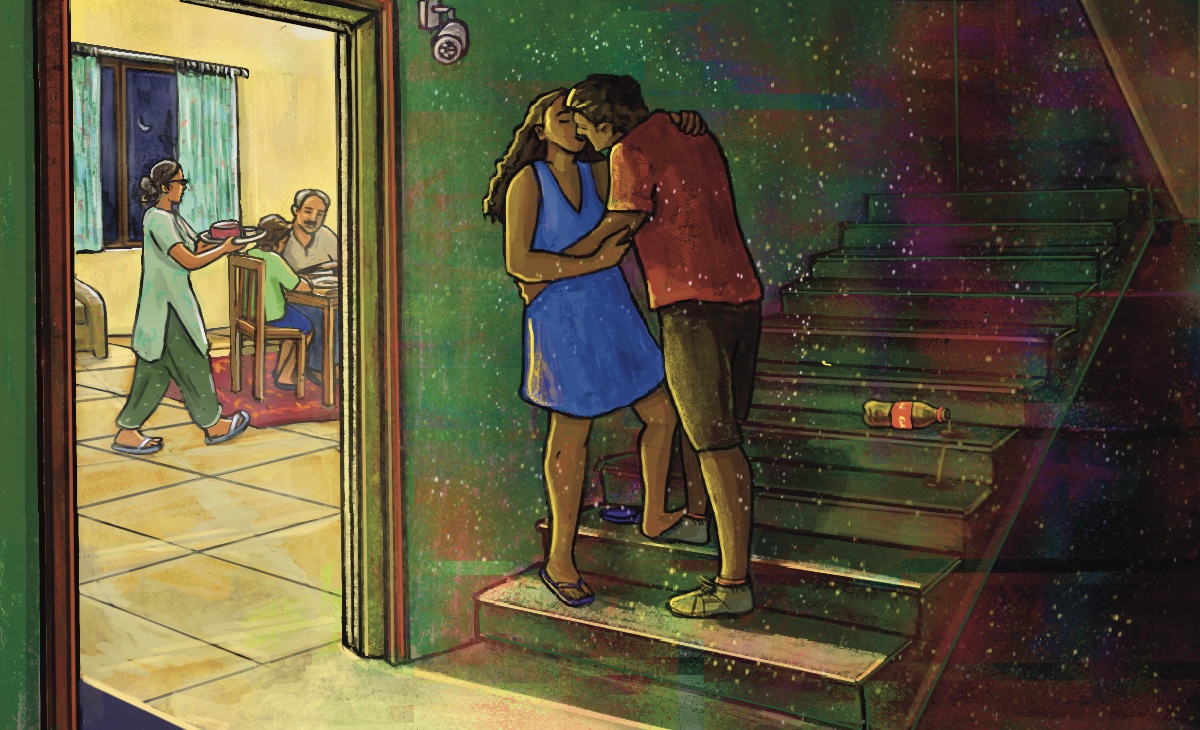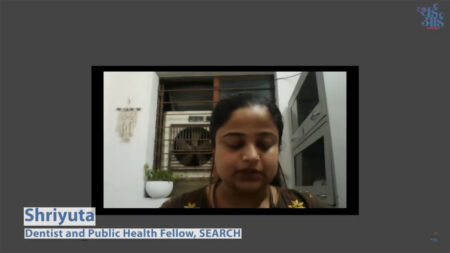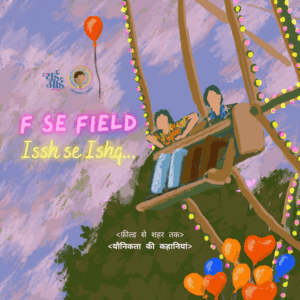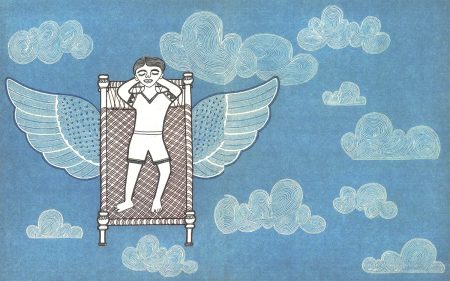This piece was developed as part of The Third Eye’s Sexy Log mentorship initiative, where a cohort of ten people across India worked independently on their experiences of sexuality, with the prompt of Pleasure & Danger.
In her essay, Egg Curry looks at the connection between prohibited foods and prohibited desires.
Arrupe Canteen is home to acidity-inducing Zinger burgers and a colourful range of other packaged foods that sustain a bustling college population. I try to be mildly health-conscious, especially when people are watching, so I usually keep my distance from its energy drink, chips and candy-covered counters. But this has not always been the nature of my relationship with Arrupe Canteen at St. Joseph’s University, Bengaluru. In its bright red, barely-functioning refrigerator, lie rows of bright red, barely-fit-for-consumption items which, for a semester or two, were a fizzy confirmation of my college-time freedom: 20-rupee Coke bottles.
You need soda to wash down dry, bread-y foods like pizza and burgers. It’s a must. This meant that when we were younger, Pappa took us to fast-food joints approximately once every eight weeks, because we were allowed to have only one soft drink every two months. This rule was negotiable, but we mostly stuck to it out of a second-hand dread of diabetes. Pappa would show us one of those images that tell you how many spoons of sugar different soft drinks have and what that much sugar, when consumed frequently, can do to your body. All the fat people on the road — he assumed and we agreed — drank sugary sodas daily. And Ma, who would do anything to lose the several kilos birth-control pills begot, would tell us that Coke was the worst of the lot: the obese white man’s favourite. For this reason, Coke was our favourite.
N and I would split one tall paper cup and giggle when the carbonated burps made our noses burn. We were happy.
I do not enjoy these burps so much anymore; they’re painful and make my eyes watery. I haven’t had a soda with N for very long. He is 13 now, his voice breaking and laughter no longer bubbly, very fond of this genre of music called phonk, and excusably rebellious, my parents tell me. I prod Ma a little and she explains that he does not sleep on time and comes home late from play on most days, so dinner gets cold. But it’s just play, nothing else; which makes the rebellion excusable. In the little chuckle that follows, I know she is measuring his rebellion in relation to mine, which must make him look very righteous. I try to relieve her of this milder, second cycle of worry; I remind her that I turned out just fine, and chatter on about my grades, writing or reading.
I ask her where they had lunch on Sunday because I cannot – do not – make it home every weekend anymore, even though my home is in the same city as my PG (paying guest house). If she names a fast-food joint, I ask her what N drank, and she says, every time, “a full cup of Coke”. I consider buying myself one but don’t, because burping alone, with no stream of health warnings to tune out while smiling slyly over the rim of my cup at a face seven years younger than mine, is no fun.
I realise, again, that it is always nicer to do wrong things in the company of others, and that N and I had not been just happy, we had been thrilled.

I seek thrill out more often than happiness, but I always assumed that the former was somehow lesser than, even inferior to, the latter. Philip Roth, in his novel The Human Stain, writes about a 71-year-old ex-professor named Coleman Silk, who has recently rediscovered his sexual potency through Viagra and has an affair with a 34-year-old cleaning lady from his college. The narrator, a sexually inactive friend of Silk’s who is wondering why Silk is telling him about the affair, declares, “He’s more than happy — he’s thrilled, and he’s bound, deeply bound to her already, because of the thrill.”
I am happy drinking Coke by myself; copious amounts of sugar aside, it is a lovely drink. But I am thrilled when I am drinking it in N’s company, with Pappa’s express disapproval offering some form of resistance to my happiness. And the experience of this happiness-turned-thrill with N, somehow, binds me to him. So, what we have so far is this: happiness + resistance + company = thrill. If you rearrange it, you have this: happiness = thrill – [resistance + company]. It is easy now for me to take Roth’s word on thrill being more than happiness, which, inferring from the equation, would mean that resistance and company make up the more-ness.
I like this equation.
I like to think that I can turn all happiness into thrill if I find company and resistance — someone who enables that happiness and someone who is opposed to it.
I also like to think of the possibility of Silk doing what would be considered the right thing (at least, more ‘right’ than the affair with someone almost half his age) — jerking off by himself in his bed after taking Viagra — not thrilled, but just happy. I like that he isn’t doing that — that this 71-year-old man is also not settling for just happiness; that he, like me, is seeking something more. I am also shamelessly taking this to mean that Roth is encouraging me to do the less right thing sometimes: to pursue the prohibited.
***
My first night at the PG, I remember, was a Sunday, because they made chicken curry for dinner. My family is Jain and this was my initiation into chicken. I ate it slowly, sitting on the balcony with a classmate who didn’t know that I was, up until then, for all official purposes, a meat virgin. I was extremely alert, worried someone might see me, and this was a delightfully scandalous kind of worry. But it soon hit me that all the someones who could be bothered by what I was doing were far away, and the delight started to slip away.
Two days later, I scaled the PG gate because I was out on a walk with K and we lost track of time. Grounds for scaling the gate, in my head, were activities like late-night drinking and hookups, not some simple pleasure like a stroll with a bosom buddy in pajamas.
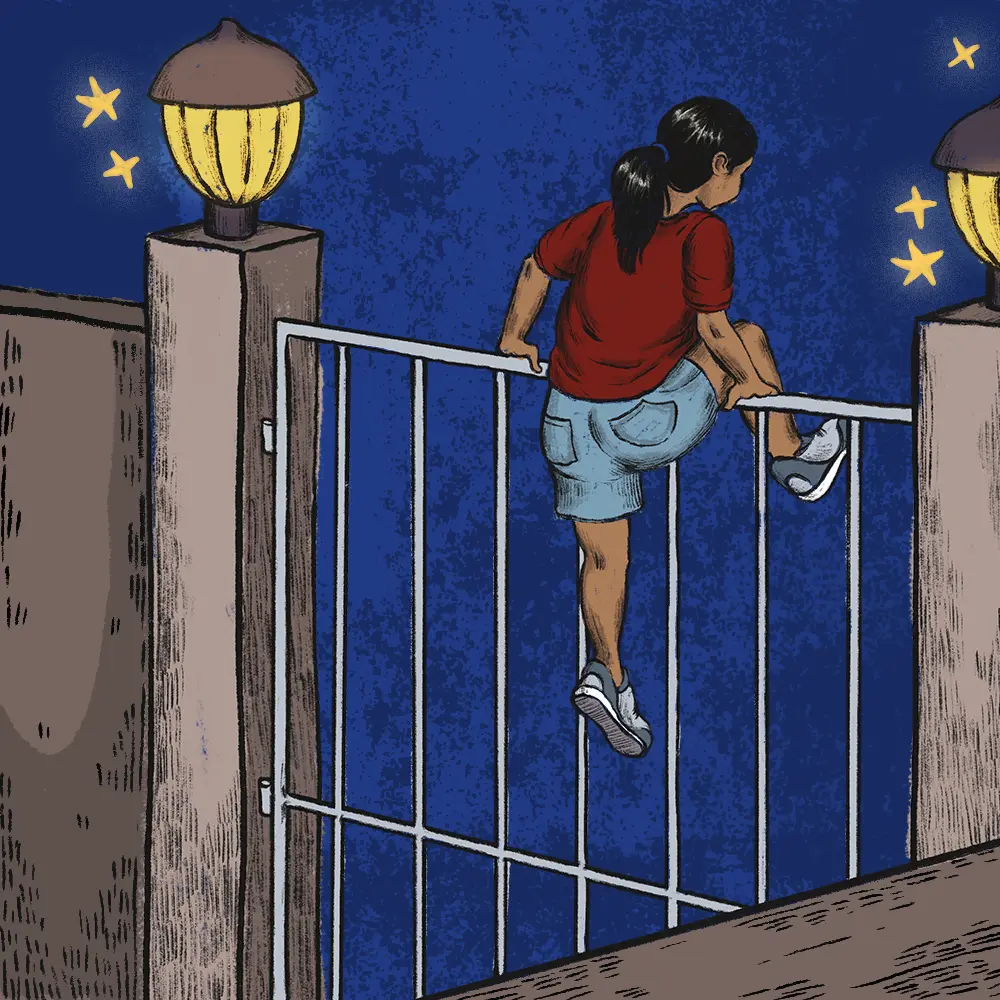
When you scale a gate, you must be giddy from thrill. Your heart should be doing somersaults because even though you could be in trouble, you have made it to the other side; scathed or unscathed, you have climbed, crossed and transgressed to earn your pleasure. K and I hadn’t even smoked a cigarette. We were so within the norms of decency and sobriety that I could have texted Ma an honest reason for having missed curfew without alarming her the slightest bit.
All of this was so anticlimactic that I stayed up thinking about new ways to set off sirens that could make my heart race again.
It is not the freedom as much as the lack of regulation — the absence of forces to unsettle and upset — that bothered me.
Thus began my first night of missing home — not for its food, or comfort, or laundry and dishes that washed themselves, but for the pleasure of rule-breaking.
***
Ma’s distaste for horror is almost at par with Pappa’s distaste for Coke, so when I chose the horror genre as an elective in my third semester, I felt like I’d done it all. I called Ma after our last hour and talked about body horror: Junji Ito’s manga adaptation of The Human Chair and the bloody scenes in Carrie. Somehow, the conversation shifted its focus to H. Neither of us changed tone. Horror and boys evoke in me the same restless ecstasy — the breathless tension that precedes a jump scare — and in her the same unease — the feverish silence that follows.
To Ma, H represents a time when I didn’t know what I was doing. But I knew exactly what I was doing.
I found H and staked him out.

Guilty lovers kiss deeper, come faster.
I wanted H more when he was denied to me, so I started a game: making Ma notice that H was an active part of my world without letting her take him away. H’s dog is sick, H likes 1D, H torrented Annabelle onto my phone. Too much of this would limit our time together, but the setup excited me — a ticking clock in my mother’s hands that only I could set off. This turned H into a ghost-like entity, omnipresent, and unbearably real.
In movies that explore horror within the framework of family, such as Carrie and Hereditary, when there is a rustle or door creak, the protagonist stupidly walks towards it. Then there is a gasp, an almost-moan and a quick, unsatisfying release, leaving you wanting more, just like our game: I am putting what H and I have in jeopardy only so I, and so only I, can rescue us. The dangerous cycle of desire (that an external threat like Ma made room for) fuelled our terrace pleasures.
Everything is very different now. I doubt that I have the capacity for such high-panic passion anymore and Ma does not ask too many questions. She flinches when I talk about body horror. I know this because she brings up men — danger I’ve desensitised her to. Forget men. Recently, during a phone call rant, I accidentally found out that she hasn’t explicitly outlawed women either.
I was narrating my confused response to a nail-paint-sporting boy who asked me if I was queer-baiting. “Can you queer-bait if you’re queer?” Apparently, you can, he explained, and I tried to relay before she cut me off, phone pressed between cheek and shoulder while rolling rotis, “Wait wait, you’re queer? Like what kind?”
“Bi.”
“Ohhh okay.”
“Can I see girls?” (I still hadn’t asked if I was allowed to see boys).
“How will I know if you do?”
Basically, she said, go do what you want, with no malice or curiosity about what I may already have been doing. Such a reply would have delighted me five years ago, but now, with the much-awaited distance from family attained, I felt like a child tugging at her mother’s dupatta at a busy billing counter. If my teen self was right in her prediction of freedom as the key to happiness, does it come at the cost of thrill?
The nostalgia for old rules has turned into a hunt for new, still-breakable ones. And while I discover bigger crimes than Coke and stricter cops than Ma, I wonder what would happen to my pleasures in a world where freedom is absolute. Would Faunia f*** Coleman if she were also 70? Would Coleman f*** Faunia if no one cared? Would I be using the word f*** if it wasn’t forbidden?
Can there be thrill without prohibition?
***
Occasionally, K comes over in the morning and we make eggs for breakfast because i) the versatility of eggs never ceases to amaze me – they’re like non-veg potatoes, ii) we have perfected this sinfully buttery and addictive French toast recipe, and iii) standing by the sink with K, learning how to crack an egg with one hand makes me feel a strange kind of sexy. Even though there’s no one to scold or stop us, there’s a kick in my stomach and a spring in my step when the strong, organic, fatty smell on my fingers reaches my nose. It may not be the same as tiptoeing up a dark staircase with a boy, but it is more than happiness.


